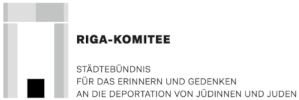Who was Marianne Dora Rein?
Who was Marianne Dora Rein?
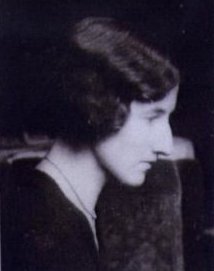
Marianne Rein was a young hopeful Jewish poet from Würzburg who was deported together with her mother in November 1941. She was born in Genoa in 1911, where her father worked as a merchant. He died early after a serious illness in 1917.
Widowed mother Hedwig Rein then moved back to Würzburg with her little daughter in the same year, where she came from the well-known Schwabacher family. Hedwig's father had been a wine merchant here, and there also had extended family living there.
Marianne grew up in Würzburg and went to the Jewish elementary school here. Later she writes about it: "We were schoolchildren (our Jewish elementary school here is my most beautiful childhood chapter, heart-fire-warmth!)".
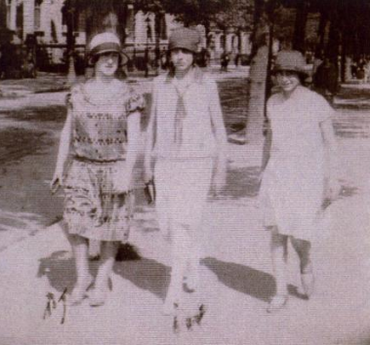
We know about Marianne Rein from three sources:
On the one hand, there is the Gestapo file on Marianne Rein and her mother. On the other hand, 113 letters written by Marianne Rein to the Jewish writer Jakob Picard between 1938 and 1941 have been preserved in an archive in New York. He had managed to emigrate to the USA, but Marianne never met him personally.
Finally, the author was able to find a childhood friend of Marianne Rein in Haifa, Ruth Meyer, later Eltes, and visit her in 2006, when she was 95 years old. She was in possession of some letters she had received from Marianne and of her letters to Liesel Steinhardt, another childhood friend.
From all this, the picture emerges of a young woman whose whole interest was literature and who wanted to become literary herself - and indeed already was. She wrote poetry and prose and had already succeeded in publishing smaller prose works and, above all, some poems in the journal "Der Morgen" published by the Jewish Cultural Association. From her letters to Picard, it is clear how seriously she took her literary composition. Her poems are predominantly nature poetry; Marianne was strongly influenced by her experiences of nature.
From the letters to Picard
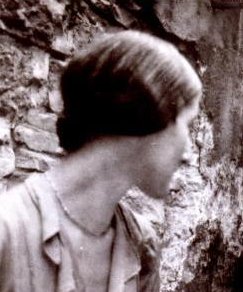
However, the letters to Picard also reveal how life in Würzburg was increasingly restricted by the measures taken by the Nazi rulers. She writes, for example, that she was no longer allowed to go to the parks and how shopping opportunities were regulated. As early as 1940, the Gestapo carried out a search in the two rooms in which mother and daughter were living as subtenants with a relative at Hindenburgstrasse 34, and the Gestapo files contain a report which states, among other things:
"The Jewess Rein is well furnished in a middle-class manner and does not own any luxury items. The following were seized and taken to the police station
- 3 candlesticks (brass)
- 1 bell (bronze)
- 1 opera glass (mother-of-pearl)
- Secured and left in the apartment was also
- 1 typewriter, brand "Erika", no. 621409/S
- 1 sewing machine, brand "Singer", retractable.“
Mother and daughter tried to emigrate and several times it seemed as if they would succeed, but finally all their hopes were dashed.
From 1941, Marianne had to work in the Jewish old people's home, and she and her mother also had to change apartments several times under ever greater restrictions. On 16th August 1941, she wrote from Hindenburgstrasse:
"Unfortunately, we will have to move out of our room very soon and we and many more don't know where yet, nor do we know if my mother and I can stay together - if alone - in one room."
Self-portrait
In fact, a few days later they had to vacate Hindenburgstrasse, and most of the furnishings were auctioned off by the Gestapo.
On 28th September 1941, she wrote to Picard:
"It is the most beautiful Franconian, blue-golden autumn, Trakl's autumn, here. “
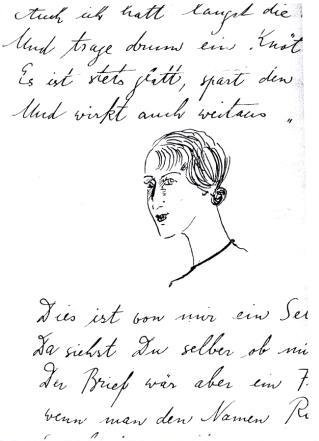
In the last letter received, dated 7th October 1941, she writes, now from Schillerstrasse:
"... I have a day off today; oh, I enjoy every minute; it is a wonderful October day - Indian Summer. Otherwise, a lot of work, which is very good for me physically and mentally. I have put on weight and know that I am doing my duty. I feel an inner peace and balance that is quite foreign to me. Of course: the longing is never silent and often I feel the need to spend a few weeks in a completely different environment just doing what our real job is. At the moment, I hardly have time to think, let alone to let grow - consciously - what wishes to form. …“
On 27th November 1941, Marianne Rein and her mother were deported with the first transport leaving Würzburg, together with another 200 people, including 40 children and young people. The transport went via Nuremberg to Riga. According to a survivor, the deportees were housed in the freezing cold farm buildings of the Jungfernhof near Riga. From there, transports departed from February 1942, the last one on 26th March 1942 with about 1700 people. All the deportees were shot on the same day in a forest near Riga. As far as is known, two of those deported from Franconia to Riga in November 1941 survived.
From what is known about Marianne Rein, a picture emerges of a serious and yet humorous, deeply feeling and at the same time self-critical young woman, whose poetic work justified great hopes, but whose future was brutally snatched away at the age of 30.
What remains of her are a few photographs, her letters containing 87 poems and a few drawings, a few publications, and finally her Gestapo file.
Poems by Marianne Dora Rein
Childhood
The sky was not yet so high,
but of a much lovelier blue.
Behind it dwelt the good Lord,
white-bearded, with bushy brows too.
The world was big, but not far at all.
It lay under our feet.
Down the stairs, out the door
it ran towards us.
The adventure does not hide it.
Covenant enticed it; from every stone,
from animal, from flower, from grass and tree,
it called us and let us in.
And day and dream, familiar siblings,
they walked hand in hand,
and wore on their necks the coloured string:
glass beads from fairyland.
In dark corners the night crouched.
O, magic fear, dark grey!
An angel flew, as bright as light,
And guarded the children's trust.
Now and then thoughts fell from look and word,
like stone into the tide.
There it sounded sweetly, there trembled away,
Rested in the deep, as though in waves.
Then it welled up, like tears heavy,
and darkened, long stayed in sight.
Sank down again, into forgetfulness and sleep?
but in us, fate began.
The Lame Duck
All words have left me.
All sighs become silent in my mouth.
Alas, I suffer.
If others knew how I suffer,
they would be wiser in my pain.
But I keep silent.
With the friendly support of
Society for Christian-Jewish Cooperation in Würzburg and Lower Franconia e.V.
